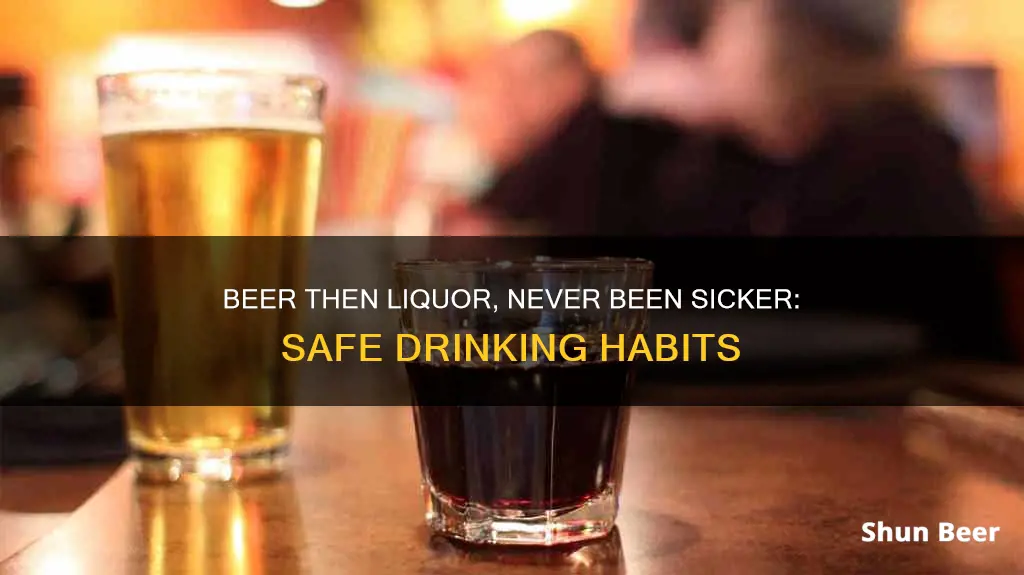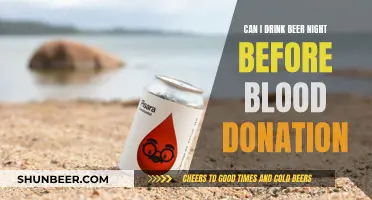
The popular saying, beer before liquor, never been sicker; liquor before beer, you're in the clear, suggests that drinking beer before liquor will result in a worse hangover. However, this myth has been debunked by modern research, which indicates that the order of consumption does not significantly affect hangover severity. The amount of alcohol consumed and other factors such as hydration, sleep, and genetics play a more crucial role in determining the risk and intensity of a hangover. While drinking liquor before beer may not prevent a hangover, starting with a drink that has a higher alcohol content can lead to lower inhibition and increased consumption. Ultimately, the key to avoiding a hangover is moderation and staying hydrated.
| Characteristics | Values |
|---|---|
| Effect on hangover | The order of consumption does not influence a person's hangover. |
| Factors that affect hangover | Amount of alcohol consumed, whether food was consumed, frequency of drinking, genetics, congeners, smoking. |
| Effect on blood alcohol levels | Liquor is more likely to spike blood alcohol levels in a short period of time compared to beer. |
| Effect on intoxication | The amount of pure alcohol (ethanol) in a drink matters more than the ABV. |
| Effect on absorption rate | Carbonated drinks can irritate the stomach lining, increasing the rate of alcohol absorption. |
| Effect of mixing | Mixing beer and liquor does not result in increased intoxication. |
What You'll Learn
- Hangover severity is influenced by the amount of alcohol consumed, not the type
- Carbonated drinks irritate the stomach lining, increasing alcohol absorption
- Liquor before beer may work because people tend to drink less beer after liquor
- Diluted vodka is absorbed faster than when served neat, according to a 2007 study
- Drinking lower-calorie options can help monitor the amount of alcohol and sugar in your system

Hangover severity is influenced by the amount of alcohol consumed, not the type
The severity of a hangover is influenced by the amount of alcohol consumed, not the type. While the causes of a hangover are not yet fully understood, several factors are thought to be involved, including acetaldehyde accumulation, changes to the immune system and glucose metabolism, dehydration, and sleep deprivation.
Although some sources suggest that drinking beer before liquor may worsen hangover symptoms, there is little scientific evidence to support this claim. The order in which you consume alcoholic drinks is unlikely to influence whether you experience a hangover the next day. This is because alcohol is absorbed into the bloodstream as soon as it reaches the stomach, so all the alcohol you drank the night before will have been absorbed long before your hangover takes effect.
Instead, the amount of alcohol you drink is a more significant factor in determining the severity of a hangover. High blood alcohol levels are more likely to induce a hangover than low blood alcohol levels. Other factors that can affect your risk of a hangover include whether you drank on an empty stomach, how frequently you drink, genetics, congeners (compounds found naturally in alcoholic beverages), and whether you smoke.
Beer at Work: Is It Legal?
You may want to see also

Carbonated drinks irritate the stomach lining, increasing alcohol absorption
The popular saying, "beer before liquor, never been sicker; liquor before beer, you're in the clear," is a myth. The order in which you consume alcoholic drinks does not matter when it comes to experiencing a hangover. The total amount of alcohol consumed is the main factor that determines the severity of a hangover. However, carbonated drinks like beer can irritate the stomach lining, increasing the rate of alcohol absorption and potentially exacerbating the negative effects of alcohol consumption.
Carbonated drinks introduce air into the stomach, similar to eating or drinking too fast. This can lead to stomach pain, bloating, nausea, and a feeling of fullness. The carbonation in these drinks can also slightly alter pH levels in the body and increase pressure in the stomach and intestines. Additionally, the sugar and artificial sweeteners in these drinks can contribute to weight gain, obesity, and digestive issues.
The effects of carbonated drinks on the stomach and digestive system can vary from person to person. While some people may experience gas, bloating, and stomach pain, others may not notice any adverse effects. However, for those who are sensitive to carbonation, even small amounts of carbonated drinks can cause discomfort.
The irritation caused by carbonated drinks on the stomach lining can increase alcohol absorption. This means that drinking beer before liquor can potentially lead to a quicker spike in blood alcohol levels compared to drinking liquor on its own. However, this effect is not solely due to the order of consumption but rather the carbonation in the beer.
In conclusion, while the order of drinking beer and liquor may not directly cause a worse hangover, carbonated drinks like beer can irritate the stomach lining and increase alcohol absorption. This irritation can contribute to the negative effects associated with alcohol consumption, such as an increased risk of stomach pain, bloating, and faster intoxication. Therefore, it is important to be mindful of the potential impact of carbonated drinks on alcohol absorption and the subsequent effects on the body.
Beer and Medifast: What You Need to Know
You may want to see also

Liquor before beer may work because people tend to drink less beer after liquor
The idea that drinking liquor before beer can help you avoid a hangover is a popular belief with no scientific basis. While many people swear by this rule, there is no research to back it up. The saying goes: "Beer before liquor, never been sicker; liquor before beer, you're in the clear." This phrase suggests that drinking beer before liquor will make you ill, but drinking liquor before beer will leave you hangover-free.
There are several theories as to how this saying originated. One idea is that most people start their evenings with drinks that have a lower alcohol content, such as beer, and progress to liquor as the night goes on. If they get sick at the end of the night or feel unwell the next day, they may blame it on drinking beer before liquor. Another theory is that liquor has a higher alcohol content and is therefore more likely to spike your blood alcohol levels in a short period of time compared to beer. So, finishing the night with liquor after drinking beer can quickly push your blood alcohol content over the edge, leading to a hangover.
However, the truth is that the order in which you consume your drinks is unlikely to influence whether you experience a hangover. This is because alcohol is absorbed into your bloodstream as soon as it reaches your stomach. So, by the time you have a hangover, all the alcohol you drank the night before will have already been absorbed. As long as the total amount of alcohol you consume stays the same, drinking liquor before beer will not protect you from a hangover any more than drinking beer before liquor.
One reason why the "liquor before beer" saying may seem true is because people tend to drink less beer after drinking liquor. Beer also takes longer to drink than a cocktail or a shot because it is larger. Therefore, if you drink beer after liquor, you are giving yourself a lower alcohol consumption rate. This means that starting your night with liquor and transitioning to beer can help you pace yourself and may be a better option for avoiding a hangover.
Beer and Epidural Steroid Injections: What's Safe?
You may want to see also

Diluted vodka is absorbed faster than when served neat, according to a 2007 study
There are many misconceptions about alcohol consumption, including the idea that drinking beer before liquor can prevent a hangover. However, the order in which you consume your drinks does not affect whether you will experience a hangover. Instead, the total amount of alcohol consumed is the determining factor.
That being said, a 2007 study found that the order of drinks can influence the rate of alcohol absorption. Specifically, the study showed that diluted vodka was absorbed faster than when served neat. This means that even if the same amount of time is taken to drink straight liquor or a glass of wine (which contain similar amounts of alcohol), the wine may lead to faster intoxication due to its faster absorption into the bloodstream.
The study compared the rate of alcohol absorption between individuals who consumed neat vodka and those who mixed their vodka with a carbonated beverage or water. Surprisingly, two-thirds of participants absorbed the alcohol faster when it was diluted, reaching peak alcohol concentration about 10 minutes earlier. This effect was observed regardless of whether the vodka was mixed with carbonated water or plain water.
While the reason for this phenomenon is not entirely clear, it is important to note that the amount of alcohol consumed and other factors, such as eating before drinking, also play a significant role in the overall effects experienced. Additionally, the volume of alcohol consumed should be considered, as drinks with higher alcohol content can lead to faster intoxication.
Beer and Augmentin: Safe Mix?
You may want to see also

Drinking lower-calorie options can help monitor the amount of alcohol and sugar in your system
For instance, a vodka soda is a good option as you will likely sip it slowly, and the water keeps you hydrated. A shot of tequila with lime is another low-calorie option, with only 99 calories. If you're a beer drinker, light beers are a better choice as they have fewer calories and a lower alcohol content.
Drinking water can also help with weight loss and reduce your hangover risk. Water increases your metabolic rate and can help you burn more calories. It can also reduce your appetite and lower your calorie intake.
Other low-calorie alcoholic drinks include:
- Gin and diet tonic
- Champagne
- Tequila with lime and sparkling water
- Dry white wines, such as Chardonnay, Pinot Grigio, and Sauvignon Blanc
- Dry red wines, such as Beaujolais, Gamay, Dolcetto, and Frappato
Beer and Theraflu: A Safe Mix?
You may want to see also
Frequently asked questions
No, it is not true. The order in which you drink beer and liquor does not matter. What matters is the total amount of alcohol you consume.
The saying is based on the idea that liquor has a higher alcohol content and is more likely to spike your blood alcohol levels quickly. However, this does not mean that drinking beer after liquor will not also increase your blood alcohol levels.
There is no chemical reaction to drinking liquor before beer that wards off hangovers. However, starting your night with liquor might help with pacing since you will be more sober to evaluate how you're feeling and adjust your consumption accordingly.
Some people tend to drink less beer after they have had liquor. Therefore, drinking liquor first might help reduce your overall alcohol consumption for the night.
The only way to completely prevent a hangover is to not drink alcohol or to drink in moderation. Staying hydrated by drinking water between alcoholic drinks can also help.







